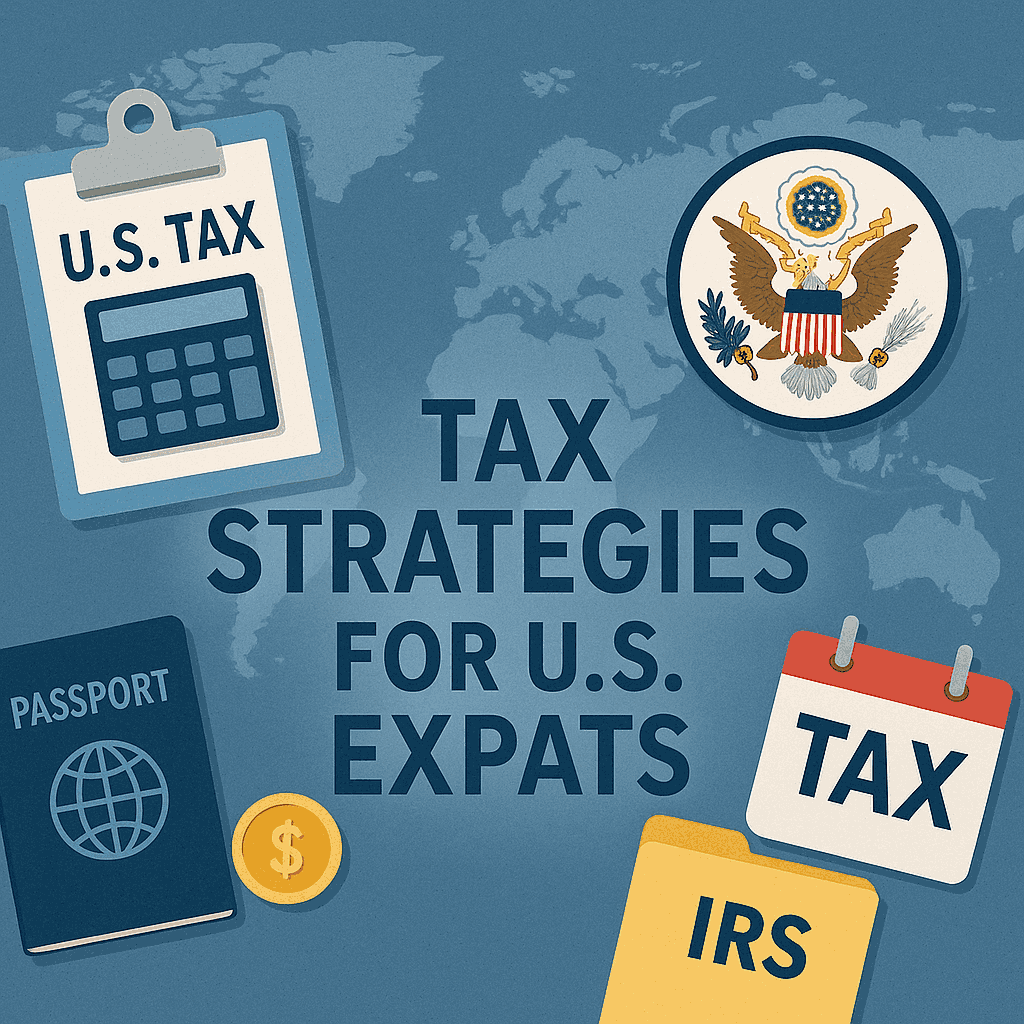
Living abroad as a U.S. expat brings exciting adventures, but it also comes with one undeniable burden — you’re still required to file and potentially pay taxes to the IRS. Yes, even while sipping espresso in Paris or teaching English in Bangkok, Uncle Sam still wants his share. Fortunately, smart tax strategies for U.S. expats can legally lower or even eliminate your tax bill.
In this guide, we’ll walk through the essential tools and techniques to help you stay compliant and keep more of your global income.
Why U.S. Expats Still Owe Taxes
The United States taxes its citizens and green card holders on their worldwide income, regardless of where they live. Even if you earn no money in the U.S., you’re required to file a tax return annually if your income exceeds certain thresholds.
Failing to do so can lead to penalties, loss of certain tax benefits, and even issues renewing your passport.
Key Tax Strategies for U.S. Expats
1. Foreign Earned Income Exclusion (FEIE)
One of the most powerful tools available to expats is the Foreign Earned Income Exclusion. For 2025, you can exclude up to $126,500 of foreign-earned income from U.S. taxation if you qualify under one of these tests:
- Physical Presence Test: You were outside the U.S. for at least 330 full days in a 12-month period.
- Bona Fide Residence Test: You were a resident of a foreign country for an entire tax year.
Note: Only income from working (not passive income like dividends) qualifies.
2. Foreign Tax Credit (FTC)
If you pay income taxes to a foreign country, you can claim a Foreign Tax Credit to avoid double taxation. This is especially useful for high-income earners who live in countries with strong tax regimes like the UK, Germany, or Canada.
The FTC is claimed on Form 1116 and can often be used alongside the FEIE, depending on how your income is structured.
3. Foreign Housing Exclusion or Deduction
For expats with high living costs, the Foreign Housing Exclusion (for employees) or Foreign Housing Deduction (for self-employed individuals) helps offset costs like rent, utilities, and property insurance.
The base amount must exceed a certain threshold, but in expensive cities like Hong Kong or Tokyo, this exclusion can be significant.
Smart Filing Strategies
4. File the Right Forms
Missing the correct forms can trigger audits or delays. Every expat should be aware of:
- Form 2555 for FEIE
- Form 1116 for FTC
- FBAR (FinCEN 114): If you have foreign bank accounts totaling over $10,000, this must be filed separately from your tax return
- FATCA (Form 8938): Required if your foreign assets exceed IRS thresholds
5. Choose the Best Filing Status
Married expats may benefit from choosing between:
- Married Filing Separately (to avoid foreign spouse complications)
- Head of Household (if you support a dependent)
Tax software or a professional expat tax preparer can run simulations to determine the most advantageous filing status.
6. Convert to a Roth IRA Before Leaving
If you expect to live abroad long-term, converting a Traditional IRA to a Roth IRA while you’re still in the U.S. may reduce future tax burdens. Since Roth IRAs grow tax-free and don’t require distributions until after death, they are excellent for expats who plan to retire overseas.
Advanced Planning: Avoid Penalties and Optimize Cash Flow
7. Set Up Tax-Efficient Investments
Be cautious with foreign mutual funds — the IRS often considers them PFICs (Passive Foreign Investment Companies), which come with nasty tax treatment. Instead, stick with U.S.-based ETFs and mutual funds inside an IRA or brokerage account.
8. Consider a U.S. Tax Professional with Expat Expertise
Expat tax rules are complicated. A CPA familiar with expat issues can save you from costly mistakes, especially with timing exclusions, claiming overlapping credits, and handling FATCA compliance.
9. Time Your Income Wisely
If your income fluctuates, consider deferring a large bonus or freelance contract until the next calendar year if it allows you to stay under the FEIE threshold. Timing can significantly affect how much you owe.
Common Mistakes Expats Should Avoid
- Failing to file: Even if you owe nothing, you must still file annually.
- Ignoring FATCA or FBAR: The penalties for skipping foreign asset disclosures can exceed $10,000.
- Using free U.S. tax software: Most don’t support expat forms and may miss critical reporting requirements.
- Assuming you don’t owe because you pay taxes abroad: Without filing properly, you lose out on tax benefits.
Tax Tips for Digital Nomads (Bonus Insight)
Digital nomads who constantly change countries may not qualify for the bona fide residence test but can still use the physical presence test. Tracking days is essential. Use apps like TaxDay or ExpatsTrack to keep a digital log of your locations.
Final Thoughts
Staying tax-compliant as a U.S. expat doesn’t have to be a nightmare — it just requires knowledge and strategy. Leveraging exclusions like the FEIE, using credits for taxes paid abroad, and filing the right forms on time can make a massive difference in how much you legally owe.
Don’t wait until tax season to start planning. Whether you’re a digital nomad, corporate expat, or retiree overseas, a smart tax plan helps you keep more of your income and sleep better at night.